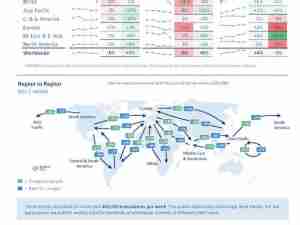Some of the world’s biggest airlines are shrinking their mammoth fuel-hedging programs after losing billions of dollars in derivatives markets last year.
British Airways parent IAG SA said it will cut its year-ahead fuel hedging to about 60% of its requirements. The company was about 90% hedged for the comparable period when the pandemic began. Similarly, Deutsche Lutfthansa AG will cut its hedging volumes by about 20 percentage points.
“Given our experience of over hedging losses during the pandemic, we’ve been reviewing our hedging policy,” said Steve Gunning, chief financial officer at IAG. “The key amendments are we’ve moved from a three-year rolling policy to a two-year rolling policy and we’ve reduced the maximum levels.”
The move comes after airlines were hit badly by oil derivatives they purchased when the pandemic first began. While they usually buy contracts to cap their costs, airlines often cheapen the deal by simultaneously selling other ones that lose money if prices fall. In normal times that’s offset by lower actual fuel costs, but with so few planes flying in 2020 the companies were suddenly left with massive losses from that side of their trades.
While some airlines have hedged small volumes in recent months, low capacity forecasts means their presence in the oil market remains light. That’s now set to continue, even if travel volumes do return to normal.
In addition to cutting the amount of fuel that they will hedge, the companies are also looking less far out. While IAG plans to reduce its presence in the market to just two years out from three, Air France-KLM previously said it is now only hedging 12 months forward.






